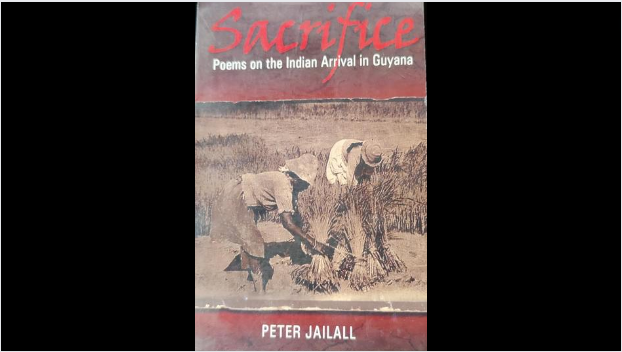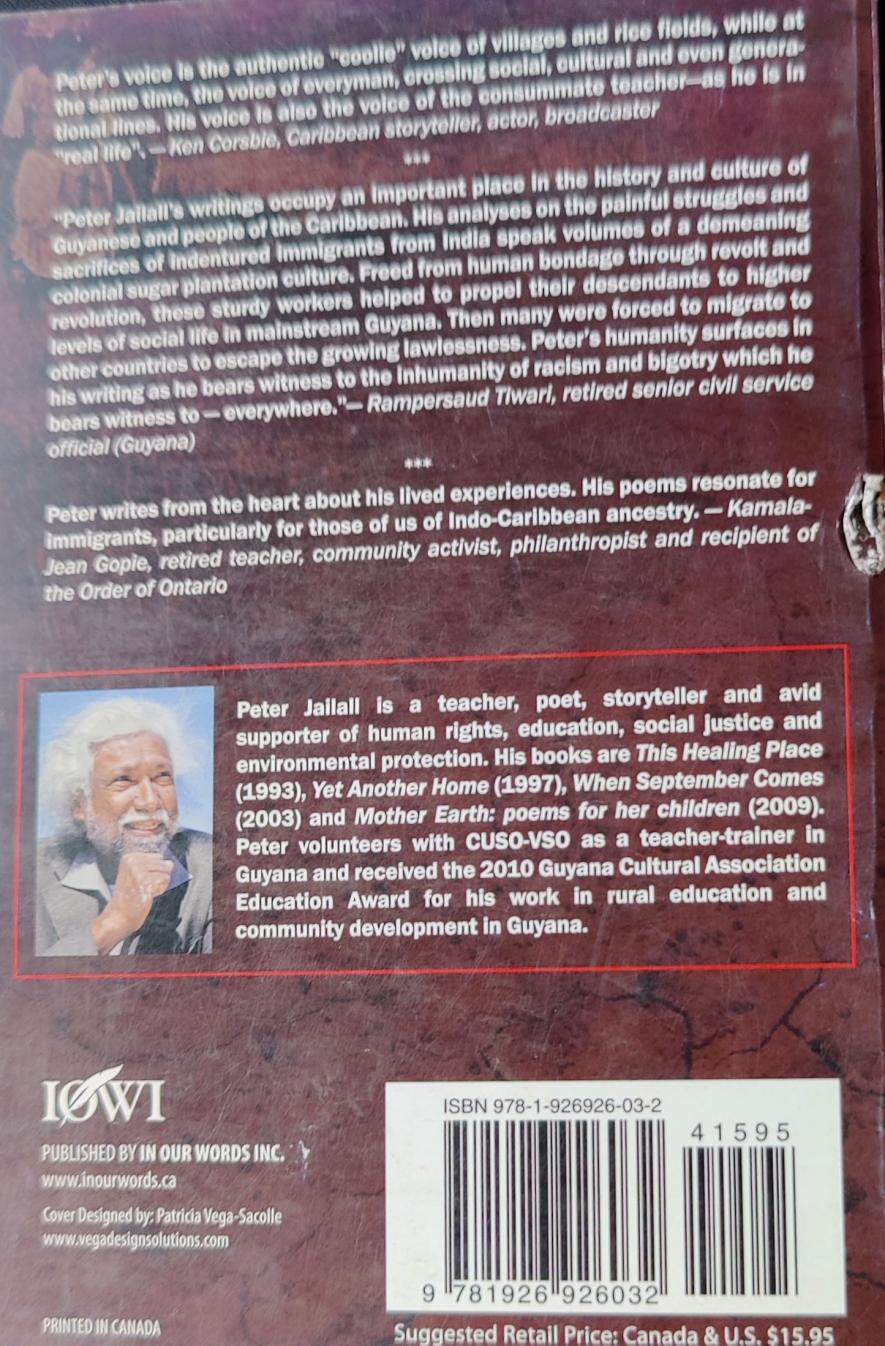Relook at a Book: Sacrifice - Poems on the Indian Arrival in Guyana

Sacrifice-Poems on the Indian Arrival in Guyana, Peter Jailall, In Our Words Ink, Canada, 2010, pages 80, price $15.95
Peter Jailall is a Guyanese poet, now settled in Canada. He has been a teacher, poet, storyteller and supporter of human rights. He is a Guyanese of Indian descent and this collection is a tribute to those Indians who arrived in Guyana as indentured labour 1838 onward, after the abolition of slavery.
Indentured Indian labour replaced African slaves to work on sugar plantations of British Guiana and other countries in the region. They were called ‘coolies’ and were treated like another kind of slaves in the initial decades of their arrival in Guyana and other countries.
Mauritius has created lot of creative literature on the horrible and oppressive conditions of Indian labour during early phases in Hindi/Bhojpuri, so has Fiji and Suriname in lesser quantity and quality in Indian languages itself. But, Guyana and Trinidad Indian descent people lost touch with their mother tongues and got submerged in English as their mother tongue in third generation of these people or so. So, the creative literature about Indian indentured labour conditions in these two countries has been written in English and Peter Jailall is one among those writers.
Abrahm H(Ivan) Khan, a Professor of Philosophy at University of Toronto, in his introduction to the book, has described these poems as ‘sacrifice captures more than the hardiness, determination and daringness among many Indo-Guyanese at home and abroad’(Forward). Forty poems of this collection are divided in three sections-‘My Forebearers’-16 poems, Sacrificial Sisters-15 poems and The Second Migration-9 poems.
The collection has been enriched by the real photographs of Indians of early period, some monuments and map of Guyana, which makes this a collection of not only poetry, but of history as well. Peter Jailall is not a sectarian poet, he is the poet of humanity and focuses on human suffering of Indian labour and also on their indomitable spirit to resist and adopt to harsh conditions. He has written poems on his grandparents-My Ajah, My Agie’s hands, ‘My Nana’s songs’ etc. In Reclaiming Gandhi ji, he pays touching tribute to Mahatma Gandhi by proclaiming ‘Gandhi Ji was one great Coolie/Who died for all a we. One can see the use of Creole in the poetry-all a we (All of us).

‘Bitta Suga (Bitter Sugar) is a powerful song-poem in the collection, where workers drink rum in the evening after a very hard day’s work in harsh conditions at the sugar plantations and for them sugar is not sweet, it is bitter!-
The folk song he sings is: ‘Rum kills me papa/Rum kills me ajah/Rum kills me nana/Rum kills the breadwinna(breadwinner)/In de(the)collie family. And his comment in poem is - On the suga(sugar) estate/Life is not sweet my love.
In the poem, ‘Beauty of the Coolie’, the poet focuses on dignity of labour and respect gained through struggles. In a poem-‘Catching the last boat’, Jailall tells the tale of those who tried to go back to India in early 20th Century, but faced a double tragedy-- Gabergeela took the boat to India with his son, leaving behind his pregnant wife to settle in his village in India. The other passenger accepted Guyana as new India and said-‘Na Ma Bhaya’. There was no one in India to accept Gabergeela and he had to return to Guyana ‘The land where he belonged’.
One can see that the poet has not tried to romanticise the Indian myth in his poems and has rather focused upon the present abode as their own countries/nation.
The section on Sacrificial Sisters is the most touching part of this collection. Poems like ‘Subadra’, Mis-educating Taramattie’,’For Better or worse’, ‘Sacrificial Sisters’ are touching depiction of women’s sufferings in Guyana at the hands of their own Indian husbands or other men. It is a reproduction of Indian social reality in Guyana, which did not change in the early phase of Indian migration. Now, it has changed a lot.
The third and last section of the collection focusses on the present condition of Indian descent people in Guyana, many of whom have prospered by now and are migrating to advanced countries, such as Canada, which is called ‘second migration’. One of the touching poems in this section is ‘For Shash’ written on June 8, 2008.
Shash Sawh was a young, idealist agriculture minister of Guyana, who was gunned down by criminals in April 2006 in his house. He was given the highest national honour and his death was mourned throughout the world. The last poem of the collection is again powerful -- ‘One Guyana’ -- where the poet sheds his Indian nostalgia and asserts that Guyana is his country, the message that should be learnt by those Indian descent people in the Caribbean countries who keep harping on ‘Indianness’ and create sectarian tensions in their countries of residence, where they prospered and enjoy all comforts. The poet declares:
Guyana is my El Dorado, my desh
Not India or Africa
Not China or Portugal
England or North America
Land of canefields, ricefields and farms
Fertilised by our ancestors’ blood, sweat and tears....
Jailall is a strongly humanist poet; he is against race, colour or class division. He believes in the dignity of labour and is free of any false notions of myths about India or others. He seeks unity with other Guyanese --black and others. His poetry is very patriotic and healthy and should be welcomed and celebrated!
Guyana has a tradition of progressive movements among people of Indian descent. Chhedi Jagan, many times President and Prime Minister of Guyana, has authored classic study, ‘The West on Trial’. The People’s Party of Guyana has many progressive leaders of Indian descent. The Marxist trend of thought had been most strong in the Caribbean country of Guyana. One hopes it revives as part of Latin American and the Caribbean unity, whom US neo-imperialism considers as its backyard, resoundingly bluffed by countries like Venezuela, Brazil, Chile, Bolivia and many more.
Chaman Lal is a retired Professor from JNU and Honorary Advisor to Bhagat Singh Archives and Resource Centre, New Delhi. He writes on some important books for Newsclick. Prof.chaman@gmail.com
Get the latest reports & analysis with people's perspective on Protests, movements & deep analytical videos, discussions of the current affairs in your Telegram app. Subscribe to NewsClick's Telegram channel & get Real-Time updates on stories, as they get published on our website.


















